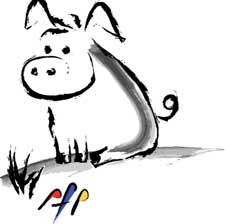The last week has been busy working in the villages and visiting members of our Pigs for Peace project in Ciriri and surrounding villages. The project continues to grow, with a total of 300 families in 15 villages participating in the original Pigs for Peace demonstration project. As we learn about the successes and challenges of families in the original project villages, we are beginning to plan for the implementation and evaluation of our Congolese-US collaborative 5-year NIH/NIMHD funded study to evaluate the effectiveness of village-led animal husbandry microfinance on health, economic stability and reintegration to family and community.
Since the team was last together in Bukavu, DRC in March 2011 to initiate the study, our colleagues have worked hard to establish infrastructure to implement the study in 10 new villages in the Walungu Territory of South Kivu. For example, throughout the course of the study 600 families will become enrolled in the project, thereby requiring us to provide 600 healthy pigs. Our solution is linked to our established Pigs for Peace project. We have built a “Pig Depot” in Ciriri village to serve as a transit site for the study pigs to the Walungu Territory. We will purchase piglets from participants in our original demonstration project (this aids them in selling the pigs for funds needed to pay school fees, medicine, or other household needs) and then house the pigs in the depot to evaluate health and vaccinate prior to transporting the piglets to study participants about 50-70km away from our demonstration villages. The depot is not only a transit center for pigs, but a training center for community members on how to build cost-effective pigpens, how to care for their pig using local plants for food and medicine, and composting pig waste for fertilizers for crops. We bring nurses, vet techs, community workers, and students to the depot to have an applied experience with animal husbandry that they can take to their communities. We are very excited about the capacity building component of the project as this increases the likelihood of sustainability long after external funding has ended.
The team has also worked with a local mapmaker to define the boundaries of our study area and the boundaries of the 10 villages where we will be working. This is important for the study implementation, as we want to insure that we are working with members in the target villages. The boundaries of villages can be difficult in rural DRC, so we need to make sure we can document over time the impact of the animal husbandry intervention on the targeted villages and avoid unknowingly serving individuals living in neighboring villages.
The administrators as well as the four Congolese research assistants (RA) have been hired and we have set-up our small Pigs for Peace office in Bukavu where the RAs and team members can meet and discuss the study before and after being in the field. The RAs and team members spend most of their time in the Walungu Territory working with the villages and families. Our Pigs for Peace office is housed with our partner PAIDEK microfinance. This was a strategic partnership since if we opened a separate office we would be vulnerable to multiple taxes. My study partner Mitima Remy gave me an example of a local water business that ended up having to sell water for more than water imported from Rwanda and Uganda because of the 45 different taxes demanded by local and provincial authorities to operate the business. Needless to say, that would limit our ability to be successful, so we are always adapting to the challenges.
We have started the village assessments in the 10 target villages. This activity is critical to gain a comprehensive understanding of the villages (population, employment, community resources and challenges) where we plan to work prior to implementing the Pigs for Peace intervention. This is also helpful in measuring the intervention impact on the village over time. The RAs completed the assessment with three villages as a pilot of the assessment tool. We met with the RAs and went over each question to learn who was best and responding (village chief, health director, church, community leaders) and then determined if revisions or additions were needed to the assessment tool before moving to the assessment implementation. The final revisions are being completed by the RAs and approval by the team is planned for Tuesday so the RAs can jump on their motorcycles to begin the assessment. The start up of a study is always challenging, especially when in a low-resource setting and using multiple languages – but there is nothing more fun and exciting.
